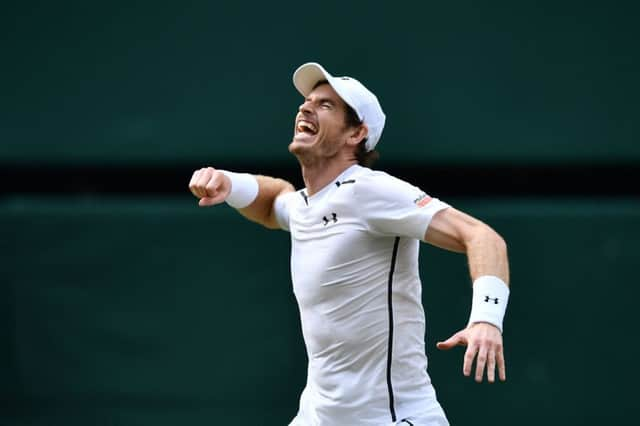Eleanor Crooks: Surely Andy Murray is UK's greatest ever sportsman


It was tough to imagine when a gangly, wild-haired teenager from Scotland first arrived at Wimbledon 11 years ago that he would go on to be the greatest British sportsman of his generation.
For that is surely what he is, even before he defeated Milos Raonic to win his second Wimbledon title in glorious sunshine on Centre Court yesterday afternoon.
Advertisement
Hide AdAdvertisement
Hide AdOnly eight men in the professional era of tennis have reached more grand slam finals than Murray’s 11 – Roger Federer, Rafael Nadal, Novak Djokovic, Ivan Lendl, Pete Sampras, Bjorn Borg, Jimmy Connors and Andre Agassi – and the leading three are all his contemporaries.
Grouped together with Federer, Nadal and Djokovic as the ‘big four’, never quite on a par with them but there to be shot at by everyone else, Murray has never complained about his lot.
He has simply done what has marked him out since his junior days, dedicated his life to wringing every last drop out of his talent.
Murray had the perfect motivation as a child growing up in Dunblane – wanting to beat his brother Jamie, who is only 15 months older.
“It didn’t matter what it was; cards, dominoes, monopoly, golf or football, they were always competing with each other,” their mother, Judy, once said. “They had a lot of fun as well as a lot of fighting. They made up their own games and they made up their own scoring systems and their own rules. I can’t say they even played or trained a lot of tennis together because they didn’t manage to last half an hour without fighting with each other!”
Scotland is still very much home even if he has not lived there permanently for half his life, and it is a source of immense pride that to many Dunblane is now known as the birthplace of a champion rather than a place of tragedy following the 1996 school massacre.
Murray has even made the Stirlingshire town, with a population of just 9,000, a bit of a tourist hotspot. Many sports fans flock to the golden postbox at the roundabout on the High Street – painted in honour of his victory over Federer in the London 2012 Olympics final – while Murray is also now owner of the nearby Cromlix House Hotel.
The people of Dunblane are proud not just of Murray’s achievements but of the man he has become.
Advertisement
Hide AdAdvertisement
Hide AdUnfailingly polite and courteous – away from the court, anyway – the 29-year-old is an unlikely sporting superstar, choosing to live as private a life as possible with wife Kim and baby daughter Sophia, who was born in February of this year.
Describing life in the locker room with some of the greatest players of all time, Australian Nick Kyrgios said: “When I see Roger, everyone sort of just looks at Roger. Roger has an aura about him. I just watch him. I don’t say anything. It’s the same with Novak. But Andy, I don’t know, it’s different.”
Understated he may be, but Murray has also proved to be one of the sport’s great trend-setters.
First there was Murray’s realisation in his early 20s that, rather than just employing a coach, having a team of people around him would help him reach his peak physically and mentally.
Then, with a grand slam title still tantalisingly elusive, he reached out to a former great in Ivan Lendl, who had stood in Murray’s shoes and helped him take the final step, winning Olympic gold and then the US Open and Wimbledon.
When their partnership came to an end – since revived of course and flourishing perfectly these past two weeks – Murray broke more ground by hiring Amelie Mauresmo, who became the most high-profile female coach in tennis.
Some of the most influential voices in Murray’s life have been female, most notably his mother Judy, and he embraced his role as an unlikely feminist.
During his link-up with Mauresmo, Murray once said that, when he suffered a dip in form, he believed the coach faced unfair criticism and prejudice from some quarters simply because she is a woman. Lendl and his other former male coaches, the Scot argued, didn’t experience similar criticism when he lost a match.
Advertisement
Hide AdAdvertisement
Hide Ad“Have I become a feminist?” Murray wrote in a column for L’Equipe at the time. “Well, if being a feminist is about fighting so that a woman is treated like a man then yes, I suppose I have.”
Most top sportsmen would rather not become embroiled in such matters but Murray, a shy but strongly-principled man, has swum against the tide to speak out on such issues as equality and doping.
In March this year he said that players’ financial rewards should be based on their on-court success rather than their sex and that “there should be equal pay, 100 per cent”. The following month he called on the ATP to spend more money on its anti-doping programme.
Britain waited 77 years for a great male tennis champion to come along. Murray, for all that he is both on and off the court, should be treasured for as long he is around, straining every sinew to be the best.